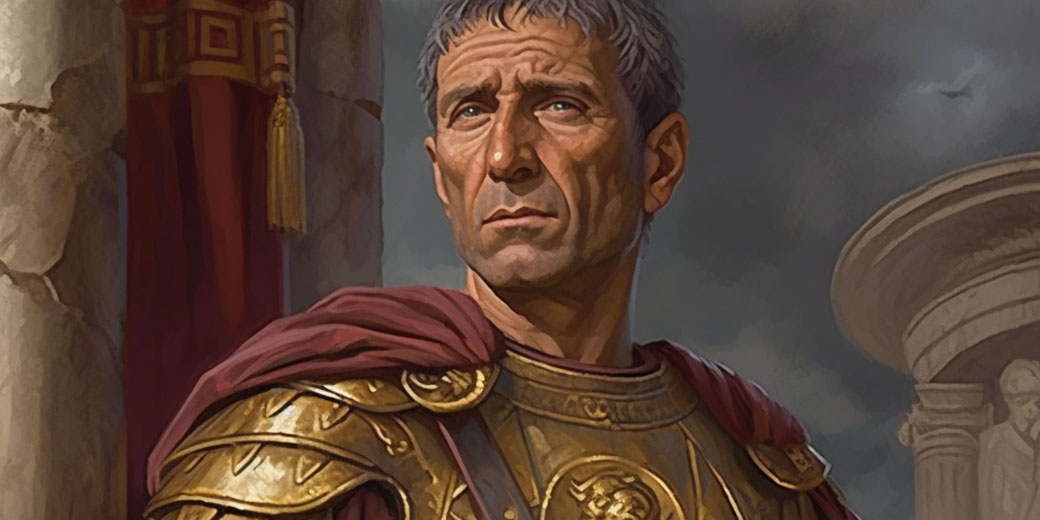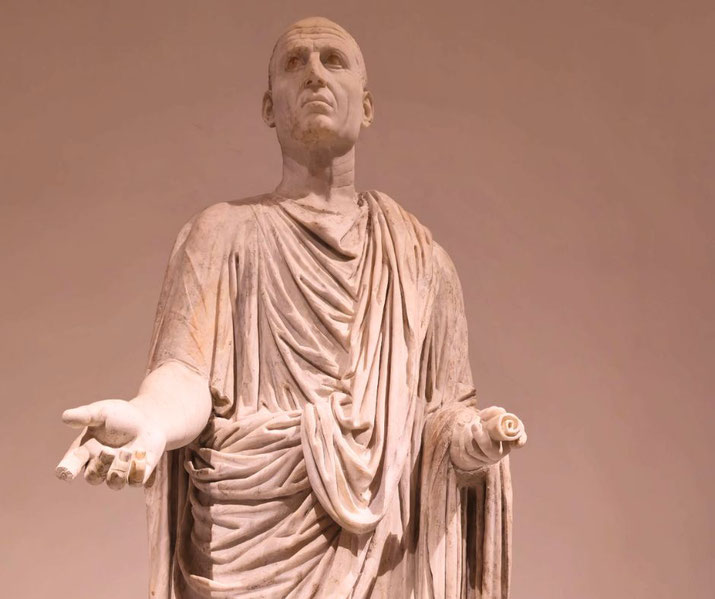Quintus Fabius Maximus: the man who saved Rome from Hannibal, but was then ignored

In Roman history, few figures loom as large as Quintus Fabius Maximus, the mastermind behind Rome's defensive strategy during the Second Punic War.
Known as "The Delayer," Fabius Maximus was a man of patience and prudence, whose unconventional tactics in the face of the formidable Carthaginian general, Hannibal, would forever change the course of military strategy.
His story is one of political ambition, military genius, and unyielding resilience, a tale that unfolds against the backdrop of one of the most tumultuous periods in Roman history.
But who was Quintus Fabius Maximus, really?
How did he rise to prominence in both the political and military arenas of Rome?
What was the "Fabian Strategy" and how did it impact the outcome of the Second Punic War?
Early life and career
Quintus Fabius Maximus was born into the illustrious Fabii clan, one of the most ancient and prestigious patrician families in Rome.
The Fabii were renowned for their political and military contributions to the Roman Republic, and young Fabius was no exception.
His upbringing was steeped in the traditions of Roman nobility, where a strong emphasis was placed on public service, military valor, and adherence to the Roman virtues of duty, discipline, and loyalty to the Republic.
Fabius's early education was typical of a young Roman aristocrat. He was likely tutored in rhetoric, philosophy, and the art of war, skills that would prove invaluable in his future career.
It was during these formative years that Fabius would have been imbued with the stories of his ancestors' bravery and sacrifice, instilling in him a deep sense of duty and a desire to uphold the family's honor.
Little is known about Fabius's personal life during this period. Like many Roman patricians, he would have been expected to marry and produce heirs to continue the Fabii lineage.
However, historical records focus more on his public life, reflecting the Roman emphasis on civic duty over personal matters.
The early years of Fabius's life were marked by the growing tensions between Rome and Carthage, which would eventually culminate in the Punic Wars.
Entry into Roman political life
Quintus Fabius Maximus embarked on his political career in the traditional Roman way, ascending the cursus honorum, the sequential order of public offices.
His first significant position was as a quaestor in 237/6 BC, a role that involved financial administration.
This role provided him with a solid foundation in the workings of the Roman state, honing his administrative skills and political acumen.
His political career took a significant leap when he was elected as consul in 233 BC, the highest political office in the Roman Republic, for the first time.
As consul, Fabius was responsible for the administration of justice and the execution of public affairs, a role that required both diplomatic finesse and decisive leadership.
His tenure was marked by a balanced approach to governance, demonstrating both firmness and fairness in his dealings.
He was elected consul multiple times (in 228, 215, 214, and 209 BC), a testament to his leadership abilities and the respect he commanded among his peers.
He also served as a censor, a position that involved maintaining the census, supervising public morality, and overseeing certain aspects of the government's finances.
Outbreak of the Second Punic War
The Second Punic War, fought between 218 and 201 BC, was a pivotal period in Roman history and a defining moment in the career of Quintus Fabius Maximus.
The war began when the Carthaginian general Hannibal launched an audacious attack on Rome, crossing the Alps with his army and a contingent of war elephants.
The initial stages of the Second Punic War were marked by a series of catastrophic defeats for Rome at the hands of the Carthaginian general Hannibal.
The battles at Ticinus River, Trebia River, and later at Lake Trasimene, were particularly devastating, leading to a significant crisis within Rome.
The Battle of Ticinus River, the first major clash of the Second Punic War, was a cavalry skirmish that resulted in a Carthaginian victory.
The Roman consul Publius Cornelius Scipio was severely wounded, and the defeat marked the beginning of a series of setbacks for the Romans.
This was followed by the Battle of Trebia, where Hannibal used superior tactics to lure the Romans into a trap, resulting in a crushing defeat for the Roman forces.
The Roman army suffered heavy casualties, and the defeat had a profound impact on Roman morale.
Appointment as dictator
The situation worsened with the Battle of Lake Trasimene in 217 BC. In one of the largest ambushes in military history, Hannibal managed to encircle the Roman army, leading to another heavy defeat for the Romans.
The Roman consul Gaius Flaminius was killed in the battle, and the loss further demoralized the Roman forces and caused panic in Rome.
These successive defeats created a sense of crisis in Rome. The Roman military was in disarray, and there was a growing fear that Hannibal's forces, now deep within Italian territory, could threaten Rome itself.
In response to this crisis, the Roman Senate took the extraordinary step of appointing a dictator to manage the war effort.
Quintus Fabius Maximus was chosen for this role, marking a significant shift in Roman strategy and setting the stage for a protracted war of attrition against Hannibal's forces.
Fabius' radical strategy to defeat Hannibal
Once in place as dictator, Fabius' response was a radical departure from the traditional Roman approach to warfare.
Instead of meeting Hannibal's forces head-on in a pitched battle, Fabius opted for a strategy of delay and attrition.
This approach, later known as the 'Fabian strategy', involved avoiding direct confrontation with Hannibal's forces.
Focusing on caution and patience, Fabius sought to wear down his enemy's forces through a war of attrition.
He focused on cutting off Hannibal's supply lines, harassing his forces with small-scale attacks, and avoiding a decisive battle that could risk the entire Roman army.
Fabius's strategy was met with considerable opposition from his fellow Romans, many of whom saw it as a sign of weakness or even cowardice.
The conflict between Fabius and Hannibal was not just a military one; it was also a battle of wits and wills.
Fabius's strategy required a deep understanding of Hannibal's tactics and a willingness to defy conventional wisdom.
Despite the criticism he faced, Fabius remained steadfast in his approach, demonstrating a level of strategic thinking and resilience that would come to define his legacy.
Growing impatience with Fabius in Rome
Marcus Minucius Rufus, who was appointed as Fabius's Master of Horse (effectively his second-in-command), was one of the main critics of this strategy.
Minucius favored a more aggressive approach and advocated for a direct confrontation with Hannibal's forces.
He believed that Fabius's cautious strategy was a sign of weakness and that it undermined Roman military prestige.
The tension between Fabius and Minucius came to a head when, during Fabius's absence, Minucius disobeyed orders and engaged Hannibal's forces directly, resulting in a temporary victory.
This success led the Roman Senate to grant Minucius equal command with Fabius.
However, when Minucius engaged Hannibal's forces in battle again, he was lured into a trap and faced a near-disastrous defeat.
Fabius, upon seeing Minucius's forces in trouble, intervened and saved the Roman army from a complete rout.
This incident validated Fabius's cautious strategy and led to Minucius relinquishing his equal command, acknowledging the wisdom of Fabius's approach.
Fabius steps down as dictator ... with disastrous results
When Quintus Fabius Maximus's term as dictator ended in 216 BC, Rome returned to its traditional leadership structure with two consuls.
The two consuls elected for the year 216 BC were Lucius Aemilius Paullus and Gaius Terentius Varro.
The newly elected consuls, particularly Varro, favored a more aggressive approach.
They believed that Rome should confront Hannibal's forces directly in a pitched battle.
This shift in strategy led to the Battle of Cannae, one of the most disastrous defeats in Roman history.
Hannibal's forces encircled and nearly annihilated a much larger Roman army, resulting in massive casualties.
The defeat at Cannae was a significant blow to Rome and led to a reassessment of its military strategy.
Despite the earlier controversy over his tactics, Fabius's approach of avoiding direct confrontation and wearing down Hannibal's forces through attrition gained renewed acceptance.

Later career and death
In the later years of his life, Quintus Fabius Maximus continued to serve Rome with the same dedication and commitment that had marked his earlier career.
He was elected consul for the fifth time in 209 BC, a testament to his enduring influence and the respect he commanded among his peers.
Despite the challenges and controversies he faced, Fabius remained a steadfast advocate for his strategic approach to warfare, a stance that would ultimately vindicate him in the eyes of history.
Fabius passed away in 203 BC, leaving behind a legacy that would resonate throughout the annals of Roman history and beyond.
Modern opinions of Fabius
Historians have often highlighted Fabius's strategic acumen and his ability to adapt to changing circumstances.
His decision to avoid direct confrontation with Hannibal's forces, focusing instead on a war of attrition, was a radical departure from the traditional Roman approach to warfare.
This strategy, while controversial at the time, has been widely recognized as a masterstroke of strategic thinking, demonstrating Fabius's deep understanding of the realities of warfare and his ability to think several steps ahead of his adversary.
Military strategists, on the other hand, have often focused on the practical implications of the Fabian strategy.
They have noted how Fabius's approach emphasizes the importance of patience, caution, and strategic planning in warfare.
These principles have been incorporated into various military doctrines and strategies, demonstrating the enduring relevance of Fabius's tactics.
What do you need help with?
Download ready-to-use digital learning resources
Copyright © History Skills 2014-2025.
Contact via email
With the exception of links to external sites, some historical sources and extracts from specific publications, all content on this website is copyrighted by History Skills. This content may not be copied, republished or redistributed without written permission from the website creator. Please use the Contact page to obtain relevant permission.





